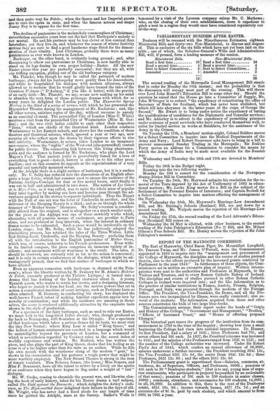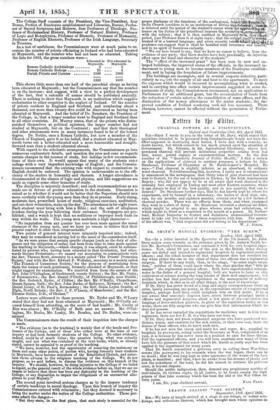REPORT OF THE MAYNOOTH COMMISSION.
The Earl of Harrowby, Chief Baron Pigot, Dr. Mountifort Longfield, Dr. Travers Twiss, and Mr. James O'Ferrall, were the Commissioners appointed in 1853 to inquire into the "management and government of the College of Maynooth, the discipline and the course of studies pursued therein, also to the effects produced by the increased grants conferred by Parliament in the year 1845." In furtherance of these objects, the Com- missioners set in motion an extensive plan of inquiry. Written interro- gatories were sent to the authorities and Professors at Maynooth, to the Visitors and Trustees, and to every Roman Catholic Bishop of Ireland. The discipline and course of studies pursued in other Roman Catholic Colleges in Ireland were inquired into ; and the like information as to the practice of similar institutions in France, Austria, Prussia, Belgium, Portugal, and Italy, was procured through the medium of the Foreign Office. The President, the Vice-President, the Deans, and all the Pro- fessors save two incapacitated by illness, were orally examined; also se- veral of the students. The information acquired from these and other sources constitutes the bulk of two large blue-books.
The Commissioners arrange their report under the heads of "Origin and History of the College," "Government and Management," "Studies," " Effects of Increased Grant," and " Means of effecting proposed Changes." The historical part traces the progress of the institution from its com- mencement in 1795 to the time of the inquiry ; showing how from a small beginning the College bad risen into national importance. Dr. Hussey, its first President, had a salary of 1051. ; three Professors had 701., and seven others had 501. each. In 1827, the President's income was increased to 3161., and the salaries of the Professors ranged from 1021. to 112/.and the number of the College authorities was increased. Under Sir Robert Peel's Act of 1845, which confers an annual allowance of 26,300/., salaries underwent a further increase ; the President receiving 5941. 128., the Vice-President 3261. 12s. 8d., the senior Dean 2641. 12e. 8d. ; three Professors, 2621. 12s. 8d. ; and the others 2411. 128. 8d.
The Parliamentary grant is apportioned thus—Salaries, commons, at- tendance, &c. of Superiors, Officers, and Professors, 60001. ; pensions of 401. each to 20 "Dunboyne students," (that is to say, young men of supe- rior attainments, who participate in property bequeathed by an ecclesiastic of that name) ; pensions of 201. each to 250 students in senior classes, 50001. ; commons, attendance, and necessaries for 620 students, 14,660/. ; in all, 26,3001. In addition to this, there is the rent of the Dunboyne estate, 4611. 10s. 9d. ; income towards burses, 467/. 17s. 7d.; and an entrance-fee of 81. fie. paid by each student, and which amount to. from 6001. to 7001. a year,
The College Staff consists of the President, the Vice-President, four Deans, Prefect of Dunboyne establishment and Librarian, Bursar, Profes- sor of Sacred Scriptures and Hebrew, four Professors of Theology, Pro- fessor of Ecclesiastical History, Professor of Natural History, Professor of Logic and Metaphysics, Professor of Rhetoric, Professor of iumanity, Professor of English Rhetoric, Professor of the Irish Language, Secretary to Trustees.
As a test of usefulness, the Commissioners were at much pains to as- certain the number of priests officiating in Ireland who had been educated at Maynooth, and the number who had not been so educated. Taking the lists for 1863, the gross numbers were—
Educated in Not educated in Maynooth. Maynootb. Roman Catholic Archbishops 2 .... 2 Roman Catholic Bishops 21 .... 4 Parish Priests and Curates ... 1199 .... 1063 1222 1069 This shows little more than one half of the parochial clergy as having been educated at Maynooth ; but the Commissioners say that the number is on the increase; and suggest, with a view to a perfect development of the fact, that a calendar of names should be published annually. There is nothing to show that Maynooth is an institution which supplies ecclesiastics to other countries to the neglect of Ireland. Of the number of priests resident in England and Scotland, and numbering about a thousand, not more than twenty-five could be discovered as having been educated at Maynooth. And the belief of Dr. Renshaw, the President of the College, is, that a larger number went to England and Scotland than to all other countries. Dr. Murray states, that of the priests who distin- guished themselves as political agitators, the larger number had not studied at Maynooth, but on the Continent ; and that their theological and other attainments were in many instances found to be of the lowest degree. Dr. Butler, once a Roman Catholic, but now a member of the Church of England, gave it as his belief, that a student educated at May- nooth turns out a better-educated and a more honourable and straight- forward man than a student educated abroad.
With regard to the scholastic arrangements, the Commissioners go into numerous explanatory-details, and mention the pros and cons as regards certain changes in the courses of study, but indulge in few recommenda- tions of their own. It would appear that many of the students enter college with a very imperfect knowledge of English ; and the Commis- sioners recommend that the existing rule with respect to examination in English should be enforced. The opinion is unfavourable as to the effi- ciency of the studies in humanity and rhetoric. A longer attendance is recommended at the classes of logic and physics, and like suggestions are made as regards some other branches of study.
The discipline is minutely described ; and such recommendations as are made are in favour of greater relaxation to the students. Discussion is raised as to whether it would not be better that the Superiors should mix more cordially with the young men than they do at present. Early rising, moderate fare, prescribed hours of study, religious exercises, meditation, and out-door relaxation, make up the day. The attendance is for eight years. Each student must bring with him a Bible ; and the oath of allegiance is taken during the year following their entrance. Newspapers are pro- hibited ; and a watch is kept that no seditious or improper book finds its way within the walls. The young men maintain a high character—
"No imputation from any quarter has ever been made against the moral character of the young men, and we have no reason to believe that their i
general conduct is other than irreproachable."
Two points of general interest were minutely inquired into ; indeed, they taay be considered as having led to the issue of the commission itself.
" As we were aware that certain specific charges [such as the duty of alle- giance and the obligation of oaths] had been from time to time made against the teaching in Maynooth,—which charges, it was alleged, could be substan- tiated by persons who, having been educated in that institution, had after- wards become Protestants,—we caused our secretaries to communicate with , the Rev. Thomas Scott, secretary to a society called 'The Priests' Protection Society,' and with the Rev. Edward F. Wolesley, secretary to a society called ' The Friends of Conscience Society,' for the purpose of ascertaining from them the names of such gentlemen, formerly educated at Maynooth, as they might suggest for examination. We received from them the names of the Rev. John O'Callaghan of Ouchterard, county Galway ; the Rev. Mr. Crotty, of Paisonstoivn ; the Rev. Daniel O'Crolly, of Phibsborougb, near Dublin; the Rev. Roderick Ryder, of Clifden; the Rev. Mr. O'Reilly, Chapelhouse, Queen Square, Bath; the Rev. John Burke, of Ballycroy, Newport ; the Rev. Daniel Leahy, of St. Paul's, Bermondsey ; 'the Rev. Denis Leyne Brasbie, of Elgin, North Britain ; the Rev. I. P. O'Leary, of Manchester; and the Rev. Thomas Butler, D.D., of Chelsea."
Letters were addressed to these persons. Mr. Ryder and Mr. O'Leary stated that they had not been educated at Maynooth ; Mr. O'Crolly ex- cused himself from attending, on the score of bad health ; Mr. Crotty of Birr was absent ; Mr. O'Reilly of Bath sent no answer. Mr. O'Cal- laghan, Mr. Burke, Mr. -Leahy, Mr. Brasbie, and Dr. Butler, were ex- amined.
The Commissioners state the result of their inquiries into the charges so made.
" The evidence [as to the teaching] is mainly that of the heads and Pro- fessors of the College, and of those who either were at the time of our inquiry or had been formerly students of the College. No other evidence, indeed, could be of much value i the question being, what was actually taughk and not what was contained in the text-books, which, as already stated, cannot be appealed to as proof of the teaching.
W " e have, however, had the opportunity of receiving the testimony on these and some other points, of parties who, having formerly been students in Maynooth, have become ministers of the Established Church, and enter- tain views adverse to the religious teaching of the College. We do not propose, as we said before, to discuss the evidence on this branch of the inquiry. We should, however, be doing injustice to the College if we failed to report, as the general result of the whole evidence before us, that we see no reason to believe that there has been any disloyalty in the teaching of the College, or any disposition to impair the obligations of an unreserved alle- giance to your Majesty."
The second point involved serious charges as to the impure tendency of certain teachings in moral theology. Upon this branch of inquiry the Commissioners entered with reluctance ; but they deemed it necessary to bring the matter under the notice of the College authorities. Those per- sons admit the danger-- "But they state, in, the first place, that such study is essential for the proppeerr discharge of the functions of the confessional, tho ie Church considers to be an institution of Divine is deferred until the period of the student's career wh trance on the duties of the priesthood imposes the n with the subject ; that it is then confined in Mayn period, (one Professor fixes it at eight days) ; that the su treated of in a learned language, and every security tak prudence can suggest that it shall be handled with reverence an reserve, and in no spirit of licentious curiosity.
" We are here bound to say, that we have no reason to believe, from the evidence of any party, that these studies have had, practically, an injurious effect upon the mind and character of the students."
The " effect of the increased grant" has been seen in new and en- larged buildings, the improved status of the officials, in the increased in- ducement to young men to become members of the Dunboyne establish- ment, and in laying the foundation of future improvements.
The buildings are incomplete, and in several respects defective, parti- cularly air regards the supply of air and heat to the apartments. To meet the expense whichwould be incurred in accomplishing what is needed, i and in carrying into effect certain improvements suggested in some de- partments of study, the Commissioners recommend, not an application to Parliament for an additional grant but the accumulation of funds from the reduction of certain salaries, the consolidation of some offices, and the diminution of the money allowances to the senior students ; the im- proved condition of Ireland rendering such aid less necessary. These changes, however, cannot be effected without the permission of Parlia- ment.



























 Previous page
Previous page